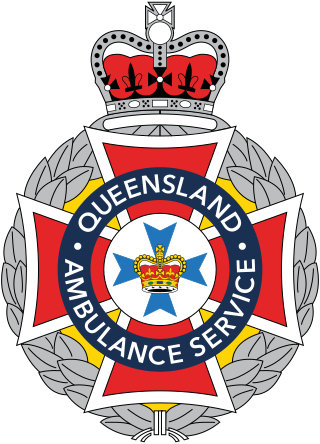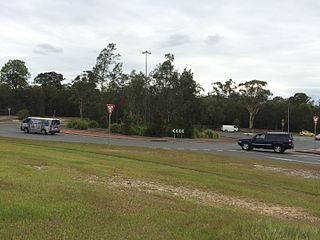
Queensland University of Technology (QUT) is a public research university located in the coastal city of Brisbane in Queensland, Australia. It has two major campuses, a modern city campus in Gardens Point and a historical campus in Kelvin Grove. The university offers courses in fields including architecture, engineering, information technology, healthcare, teaching, law, arts and design, science and mathematics.
Traffic psychology is a discipline of psychology that studies the relationship between psychological processes and the behavior of road users. In general, traffic psychology aims to apply theoretical aspects of psychology in order to improve traffic mobility by helping to develop and apply crash countermeasures, as well as by guiding desired behaviors through education and the motivation of road users.

Risk compensation is a theory which suggests that people typically adjust their behavior in response to perceived levels of risk, becoming more careful where they sense greater risk and less careful if they feel more protected. Although usually small in comparison to the fundamental benefits of safety interventions, it may result in a lower net benefit than expected or even higher risks.

Central Queensland University is an Australian public university based in central Queensland. CQUniversity is the only Australian university with a campus presence in every mainland state. Its main campus is at Norman Gardens in Rockhampton, however, it also has campuses in Adelaide (Wayville), Brisbane, Bundaberg (Branyan), Cairns, Emerald, Gladstone, Mackay, Melbourne, Noosa, Perth, Rockhampton City, Sydney and Townsville. CQUniversity also partners with university centres in several regional areas across Australia.

Driving simulators are used for entertainment as well as in training of driver's education courses taught in educational institutions and private businesses. They are also used for research purposes in the area of human factors and medical research, to monitor driver behavior, performance, and attention and in the car industry to design and evaluate new vehicles or new advanced driver assistance systems.
The QUT Business School is one of six faculties at the Queensland University of Technology. It is home to the QUT Graduate School of Business, as well as four-discipline focused schools; the School of Accountancy, the School of Advertising, Marketing and Public Relations, the School of Economics and Finance, and the School of Management. In 2015, the QUT Business School had enrolled a total of 8,971 students across the faculty, including 2,962 international students.

Carseldine is a suburb in the City of Brisbane, Queensland, Australia. In the 2016 census, Carseldine had a population of 9,541 people.

Safety culture is the collection of the beliefs, perceptions and values that employees share in relation to risks within an organization, such as a workplace or community. Safety culture is a part of organizational culture, and has been described in a variety of ways, notably the National Academies of Science and the Association of Land Grant and Public Universities have published summaries on this topic in 2014 and 2016.
The Royal Automobile Club of Queensland Limited (RACQ) is a mutual organisation and Queensland’s largest Club, providing services including roadside assistance, insurance, banking and travel to its approximately 1.75 million members.

Mobile phone use while driving is common but it is considered dangerous due to its potential for causing distracted driving and subsequent crashes. Due to the number of crashes that are related to conducting calls on a phone and texting while driving, some jurisdictions have made the use of calling on a phone while driving illegal in an attempt to curb the practice, with varying levels of efficacy. Many jurisdictions have enacted laws making handheld mobile phone use illegal. Many jurisdictions allow use of a hands-free device. Driving while using a hands-free device has been found by some studies to provide little to no benefit versus holding the device itself and carrying on a conversation. In some cases restrictions are directed only at minors, those who are newly qualified license holders, or to drivers in school zones. In addition to voice calling, activities such as texting while driving, web browsing, playing video games, or phone use in general may also increase the risk of a crash.

The Institute of Health and Biomedical Innovation (IHBI) was an Australian collaborative medical research institute established in 2000 and based at the Queensland University of Technology (QUT) in Brisbane, Queensland. While the bulk of the institute was located at a purpose-built facility on the Kelvin Grove campus of QUT, a number of projects were conducted at sites across the two main QUT campuses and at multi-partner research institutes adjoining major hospitals. Research was also conducted at IHBI's Medical Engineering Research Facility (MERF), in the grounds of the Prince Charles Hospital.
The Monash University Accident Research Centre (MUARC) is a research institute in the injury prevention field. The centre is located at the Clayton Campus of Monash University in Victoria, Australia.
Susan Fiona Dorinthea Michie is a British academic, clinical psychologist, and professor of health psychology, director of The Centre for Behaviour Change and head of The Health Psychology Research Group, all at University College London. She is also an advisor to the British Government via the SAGE advisory group on matters concerning behavioural compliance with government regulations during the COVID-19 pandemic. In 2022, she was appointed Chair of the World Health Organisation’s (WHO) Technical Advisory Group on Behavioural Insights and Sciences for Health.
Worker road safety refers to the economic, societal, and legal ramifications of protecting workers from automobile-related injury, disability, and death. Road traffic crashes are a leading cause of occupational fatalities throughout the world, especially in developing countries. In addition to the suffering of the workers and their families, businesses and society also bear direct and indirect costs. These include increased insurance premiums, the threat of litigation, loss of an employee, and destruction of property.

The Queensland Ambulance Service (QAS) is the state emergency ambulance and patient transport provider in Queensland, Australia. QAS is part of the Queensland Government under the Queensland Health portfolio and is one of the largest ambulance services in the world.
David Shinar is one of the most prominent and productive researchers in the area of traffic safety, and a professor emeritus at Ben-Gurion University of the Negev, Israel.

Norwell is a rural locality in the City of Gold Coast, Queensland, Australia. In the 2021 census, Norwell had a population of 189 people.
Colleen Nelson is a scientist in prostate cancer research. She founded and directs the Australian Prostate Cancer Research Centre – Queensland (APCRC-Q). The Centre, based at the Translational Research Institute and the Princess Alexandra Hospital, spans the spectrum of discovery of new therapeutic targets and their preclinical and clinical development. She is also Chair of Prostate Cancer Research at Queensland University of Technology (QUT).
Judith Ann Clements is an Australian academic and educator, specializing in Kallikrein proteases in prostate and ovarian cancers. Clements is the scientific director at the Australian Prostate Cancer Research Centre – Queensland and was head of the Cancer Research Program at the Institute of Health and Biomedical Innovation (IHBI) of Queensland University of Technology at the Translational Research Institute (Australia) from 1997–2014.

Mount Cotton Road, or Mt Cotton Rd, is a major split road in the Brisbane area of South East Queensland, Australia. It runs in both an east-west direction between Burbank (Brisbane) and Sheldon (Redlands), and a north-south direction between Capalaba (Redlands) and Carbrook (Logan). In total, the road is approximately 26.5 kilometres (16.5 mi) long, and is split at a three-way roundabout.











